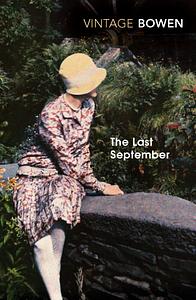Take a photo of a barcode or cover
informative
reflective
slow-paced
Plot or Character Driven:
Character
Strong character development:
No
Loveable characters:
Complicated
Diverse cast of characters:
Yes
Flaws of characters a main focus:
Complicated
Very good read.
emotional
reflective
tense
slow-paced
Plot or Character Driven:
Character
Strong character development:
Complicated
Loveable characters:
No
Diverse cast of characters:
No
A very nearly perfect novel, the sort of book Brideshead Revisited might have wished to be if it were able to grow up. In 1920 or 1921, an Irish Great House receives two visitors and news of a departure whilst history and horror press against its boundaries. Bowen writes like a compassionately icy divinity, all-seeing and understanding. "Cast a cold eye..." indeed.
funny
reflective
sad
medium-paced
Plot or Character Driven:
Character
Strong character development:
Complicated
Loveable characters:
Complicated
Diverse cast of characters:
No
Flaws of characters a main focus:
No
My first Elizabeth Bowen. The prose seems so fresh and original, if sometimes a bit opaque. This is a coming of age story involving Lois, a young, Anglo-Irish orphan living with her relatives at the time of the 1920-21 "Anglo-Irish War." It surprised me how strongly the Anglo-Irish identified with the Irish (not with the English) despite their 'role' in Ireland. Also surprising (and delightful) to me was the biting satire, especially the portrait of Lady Myra Naylor. There are some incredible passages in which descriptions of the Naylor house render it a character in itself.
emotional
reflective
slow-paced
Plot or Character Driven:
A mix
Strong character development:
No
Loveable characters:
No
Diverse cast of characters:
Complicated
Flaws of characters a main focus:
Complicated
This was Elizabeth Bowen's own favourite book. Superficially the plot is that of a "rose-coloured" 1920s love story, set in and around Danielstown, one of the many 18th century Big Houses of Ireland. Surrounded by landscaped gardens and tennis courts, its vast demesne stretches to infinity for miles and miles of fields and streams. The city of Cork is somewhere far away. This house, with its rooms and staircases and windows, and its many servants hidden away, is really the main protagonist of the novel.
In an incessant whirl of arriving and departing guests, the owners of the estate and come and go, visiting other Big Houses and gossiping elegantly about one another. Nobody actually "does" anything; the nearest any of them come to "work" is giving the day's instructions to the cook, or calling a manservant to take some letters into town for the post. They exist in a condition of physical and cultural detachment and they choose their acquaintances carefully so that they are of the desired social standing.
The heroine, Lois, is a vaguely modern young woman - but that's only because she reads magazines and newspapers that are delivered to the house or are left behind by guests, and because she has a visitor who tells her about the outside world. Her detachment from reality is deliberate, and is carefully maintained, because for Lois it would be inelegant to take too much interest in current affairs - though even she can sense that Ireland is in the turmoil of the war of independence and that revolutionaries are roaming the countryside. Reality is coming to destroy these people, their Big Houses, their way of life, and their patrician detachment. They are only vaguely aware of it and do their best not to talk about it.
Bowen's prose is tremendous: abrupt, surprising, going in unexpected directions, fresh and beautiful like the flowers and landscapes she so often describes. As an author she has the same detachment as her characters and like Lois, she keeps her modernity at arm's length as something one knows about but tries not to be too much affected by (there is a faintly horrified remark about young women going to work on crowded trams in faraway Dublin). She writes from a distance, observing people she obviously knew well with a faintly sardonic sense, whose behaviour is ridiculous and often very funny.
In his 2019 critique of Bowen's short stories (in the New York Review) John Banville - whose novels have a satirical detachment of their own - noted that "something is always lurking beneath the exquisitely limned surface of Bowen’s fictional world". In this case the thing that's lurking is the war just outside the gates, which somehow seems to be impinging on this elegant Irish summer of tennis and afternoon tea as it fades into autumn. Gerald is a British officer commanding the local Black and Tans and Lois makes the mistake of falling in love with him. The dénouement, as you'd expect, is disastrous not only for Lois and Gerald, but for the whole way of life of an ascendant class that is about to lose control.
The novel began with an arrival and it ends elegantly with a final departure. Truly this was the Last September and on reaching the final page, this reader was so moved and had been so engrossed that he found himself shedding a tear. One of the great modern novels of Irish literature.
In an incessant whirl of arriving and departing guests, the owners of the estate and come and go, visiting other Big Houses and gossiping elegantly about one another. Nobody actually "does" anything; the nearest any of them come to "work" is giving the day's instructions to the cook, or calling a manservant to take some letters into town for the post. They exist in a condition of physical and cultural detachment and they choose their acquaintances carefully so that they are of the desired social standing.
The heroine, Lois, is a vaguely modern young woman - but that's only because she reads magazines and newspapers that are delivered to the house or are left behind by guests, and because she has a visitor who tells her about the outside world. Her detachment from reality is deliberate, and is carefully maintained, because for Lois it would be inelegant to take too much interest in current affairs - though even she can sense that Ireland is in the turmoil of the war of independence and that revolutionaries are roaming the countryside. Reality is coming to destroy these people, their Big Houses, their way of life, and their patrician detachment. They are only vaguely aware of it and do their best not to talk about it.
Bowen's prose is tremendous: abrupt, surprising, going in unexpected directions, fresh and beautiful like the flowers and landscapes she so often describes. As an author she has the same detachment as her characters and like Lois, she keeps her modernity at arm's length as something one knows about but tries not to be too much affected by (there is a faintly horrified remark about young women going to work on crowded trams in faraway Dublin). She writes from a distance, observing people she obviously knew well with a faintly sardonic sense, whose behaviour is ridiculous and often very funny.
In his 2019 critique of Bowen's short stories (in the New York Review) John Banville - whose novels have a satirical detachment of their own - noted that "something is always lurking beneath the exquisitely limned surface of Bowen’s fictional world". In this case the thing that's lurking is the war just outside the gates, which somehow seems to be impinging on this elegant Irish summer of tennis and afternoon tea as it fades into autumn. Gerald is a British officer commanding the local Black and Tans and Lois makes the mistake of falling in love with him. The dénouement, as you'd expect, is disastrous not only for Lois and Gerald, but for the whole way of life of an ascendant class that is about to lose control.
The novel began with an arrival and it ends elegantly with a final departure. Truly this was the Last September and on reaching the final page, this reader was so moved and had been so engrossed that he found himself shedding a tear. One of the great modern novels of Irish literature.
Nothing was really happening in this book which I normally enjoy however in this case it made it impossible to follow for me.
JUST FINISHED THIS YALLL and I really loved. very to the lighthouse meets pride and prejudice. big fan. her writing is fantastic. some of these sentences go CRAZY
challenging
informative
slow-paced
Plot or Character Driven:
A mix
Strong character development:
Yes
Loveable characters:
Complicated
Diverse cast of characters:
No
Flaws of characters a main focus:
Yes
emotional
hopeful
reflective
sad
slow-paced







